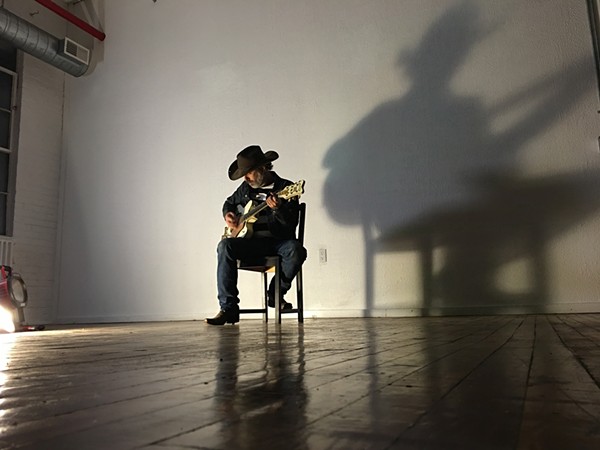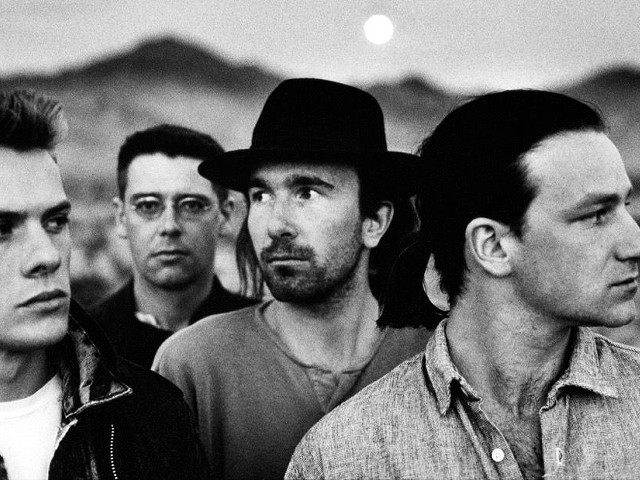Ethan Daniel Davidson has stories to tell, but they're not exactly nice ones. Davidson simply isn't that interested in "nice" stories, but he does want to examine how people can build better relationships with one another. Crows, his latest release, is an exploration of these themes and more, perfectly paired with the folky, avant-garde Americana sound that finds its most coherent expression on this album, the tenth he has released in 18 years.
The 47-year-old singer-songwriter, whose father happens to be the late Bill Davidson of former-Pistons-ownership fame, spent nearly two decades off and on wandering the world, including an extended stay living in Alaska, hitchhiking across Turkey, and 13 trips across the Atlantic via ship, one of which took place on a container ship going from Montreal to Liverpool on which he was the only passenger and the captain was drunk the entire way across the ocean.
He is now living a quieter life based in the suburbs of metro Detroit, raising three boys with his wife Gretchen Gonzales Davidson. You may know her from the underrated Detroit psychedelic garage pop group Slumber Party; she sings and plays guitar on Crows and was a vital force in determining the direction of the album. Warren Defever of His Name Is Alive is another such force; he produced the album and contributed musically as well.
"Warren and Gretchen said nobody's ever challenged you to write one type of song over and over again," Davidson tells us. The type chosen, in this case, was '50s country. While the songs that came to form Crows didn't end up as '50s country songs in the end, Davidson found the constraint to be quite liberating from a songwriting point of view.
The resulting album is perhaps his most focused yet, filled with the beauty of expansive spaces as much as the beauty of philosophical reflection. Davidson's voice is warm and full, but the folks he sings about may not be so warm themselves. More often than not they are seasoned in bitterness and steeped with sorrow; you only need to hear lines like "I can't wait to laugh at your misfortune" or "The human heart is so unfair, it will betray you every time" to get to the root of these feelings. Hope is also bubbling under the surface too, though — hope for the future and hope in one's own betterment, in spite of it all.
"Close to the Gallows" is this writer's favorite; the beating of the drums implants heartbeats and horse hooves directly into the listener's mind as electric guitar slowly swells in the background. "Outside of Town" is another standout track, featuring a Beach Boys-esque vocal harmony opening before taking a turn into the folkier avant-garde Americana sound that runs through the entire album. Other musical comparisons might include Destroyer and Calexico at one end, Willie Nelson and Leonard Cohen at the other, but ultimately, Davidson's voice and vision are truly his own.
In advance of the record release party at Third Man next week — with the album officially out on June 13 via Blue Arrow Records, also home to Jonathan Richman and Jon Langford of the Mekons — we sat down with Davidson to discuss the poetic and philosophical influences within Crows and the performance that stands out most from the 900-plus he played in his nomadic years, among other things.
Metro Times: Tell me about the title, Crows.
Ethan Daniel Davidson: Darkness. But also independence, aloneness. You know, crows are in the middle of the road somewhere eating something dead. The idea in "My Crows" and for the whole album, is the guy in the song at least has the self-awareness to know that he's the one responsible for feeding the darkness inside of himself. But the problem he has is that he still wants love to meet him on his terms, [instead of] letting love be love and coming to love.
MT: Are the people in your songs characters?
Davidson: Yes, they are characters, but also parts of me. There's lots of stuff in there about gunfighters, [but] I've obviously never been a gunfighter. What's the worst thing you can do to a person? It's to harm them physically or end their life, so that's a good place to start when you're talking about people who are having a tough time relating to people's humanity. I find that those kind of cowboy, Western motifs in the lyrics are useful for exploring that. So it's not me, and it's me, and it's all of us.
MT: Some unique people are cited as your inspirations on this album, including poet Edward Dorn and Hassidic existentialist philosopher Martin Buber. Tell me about these influences.
Davidson: I got introduced to the poetry of Edward Dorn maybe a decade ago. He has a long poem called "Gunslinger" which is the one that I read over and over again. I really liked the way that he used cowboy themes to talk about purity of action. That really resonated with me. The other thing with him that I really liked is that he had this concept that the minute you are able to describe something, to describe a person — which gets into Martin Buber's thinking too — the minute I reduce you to a whole list of attributes, you're X tall, you like this kind of food, you do this, I reduce you to an object. In some way I began to deny you whatever it is about you that is transcendent. Ed Dorn and Martin Buber come at that idea from different traditions, certainly, but the whole idea that a person isn't just a list of qualities. A person is a person, there is something transcendent about every person.
MT: Can you name a favorite song on Crows?
Davidson: It changes every day. Yesterday we recorded a thing for WDET and we played this song that's a little deeper into the record called "Coyote." I like that one because it's probably the most countryish, in a way, and it deals with the theme of how to connect to another person most explicitly.
MT: Among the 900-plus shows of your life, could you possibly name a favorite, or one that stands out the most?
Davidson: I got to play once for 5,000 Hells Angels at a campground in South Dakota. The main stage had Alice Cooper on it, and we were on this little side stage. We were supposed to play from 2 to 5 in the morning, just out in the middle of this field. We went on after this tattooed lady with a metal band behind her. They booed her off the stage, so we're like, "Holy shit, we're a bunch of longhaired guys, we're gonna go up there and play old country music and old R&B, and they're gonna murder us." [Laughs] But we couldn't leave, out in the middle of this giant outlaw biker camp, so we had to go up and play. And they ended up really liking us, but a biker jumped up on the stage and whispered in my ear that I should stop singing and just let the guitar player play. I was like, "Whatever you want, it's your show." [Laughs] We ended up playing for three nights there. When we were leaving, I was looking at my skin and it was totally golden, so I thought I had gotten a wonderful tan being outdoors in South Dakota in the middle of August. But the next night when I went into a motel and showered, it all washed off. It was just dirt and exhaust from motorcycles.
MT: You lived in the Cass Corridor for a little while. What are your memories of Detroit bands at the time?
Davidson: I saw a lot of bands. But when I saw the Gories at the Old Miami, probably in 1989, it was like nothing I had ever seen before. They just totally blew the roof off of anything that I knew about. I knew about blues music because of the high school rock band I had just been in, but I had never heard it presented the way the Gories did it. I remember seeing bands like the Generals, Happy Death Men, Vertical Pillows, but there was nothing remotely like the Gories.
MT: What has been an unconventional influence on your music?
Davidson: I had a teacher in high school who liked to walk around outside and smoke cigarettes and look at the trees. I've never been a cigarette smoker, but I would go and talk to him about the trees. He would tell me, "This is a slippery elm, and this is a box elder, and this one over here is staghorn sumac." I tell myself every year that I'm going to do this in the spring, but I want to sit there, look at a tree, and see if I can't see when the leaf is emerging from the bud, because I want to know what that kind of emergence is like. I want to go outside, look at a living thing, and try to recognize what about it is transcendent. I guess that's a long way of saying that slippery elm is an unconventional influence on my music.
Crows is available on vinyl, CD, and MP3 from Cleveland's Blue Arrow Records. Ethan Daniel Davidson will perform some songs and celebrate the release of the new album on Tuesday, June 13 at Third Man Records; Doors at 8 p.m.; 441 W. Canfield St. W., Detroit; admission is free but you must RSVP at bit.ly/2qG74YO; 21 and over.






